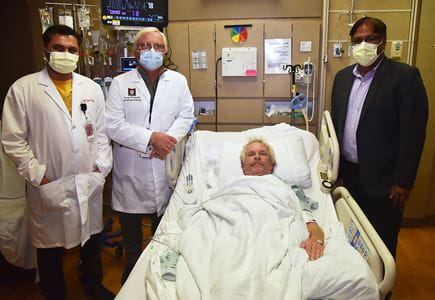INDIANAPOLIS—A groundbreaking new clinical trial to determine the effectiveness of a new treatment for patients with acute heart attack is now underway at Indiana University School of Medicine, with the first patient enrolling this month.
“About half of all people who have heart attacks end up with bleeding within the heart muscle,” said Rohan Dharmakumar, PhD, executive director of the Krannert Cardiovascular Research Center. “Over the past decade, our studies have aimed to understand the acute and chronic effects of intramyocardial hemorrhage. These studies have led to the understanding that iron from the bleeding drives the formation of fatty tissue in the heart. When the damaged heart muscle is replaced with fatty tissue it can’t push blood from the heart effectively, resulting in heart failure.”
The study aims to determine if treatment to remove the residual iron within the damaged heart can lead to better outcomes in patients who have experienced an acute heart attack and have bleeding within the heart muscle. Patients in the study have had an acute heart attack, both with and without bleeding into the heart muscles after opening the blocked artery by emergency stenting. They will be randomized into four groups, two that will receive iron chelation therapy and two that will receive a placebo, with each of the two groups randomized to have those with and without bleeding into the heart muscle.
“Recent advances in imaging have shown that heavy bleeding inside the damaged part of the heart can predict long-term heart failure and major cardiovascular problems, such as abnormal heart rhythms, palpitations, fatigue and fainting,” Dharmakumar said. “We hope to see if deferiprone decreases the chances of having these major cardiovascular issues as well as observe the side effects of deferiprone in heart attack patients.”
Deferiprone has been approved by the United States Food and Drug Administration (FDA) for other conditions, but not for clinical care for heart attack patients. This study, approved by FDA for the investigational purpose of the trial, hopes to enroll 60 patients and follow them for six months. In addition to taking deferiprone, study participants will provide blood and urine samples and have several electrocardiograms and magnetic resonance imaging (MRI) of the heart.
“This is the first clinical trial to focus on this difficult cardiovascular complication,” Dharmakumar said. “We are excited to begin enrolling more patients and studying this treatment in humans for the first time.”
###
IU School of Medicine is the largest medical school in the U.S. and is annually ranked among the top medical schools in the nation by U.S. News & World Report. The school offers high-quality medical education, access to leading medical research and rich campus life in nine Indiana cities, including rural and urban locations consistently recognized for livability.




